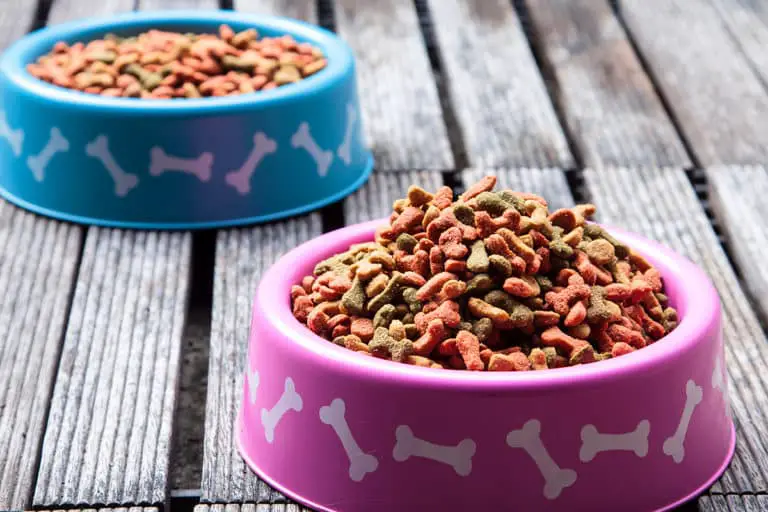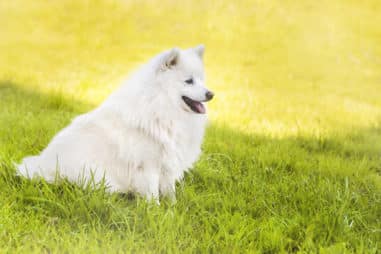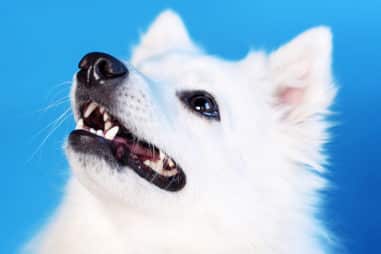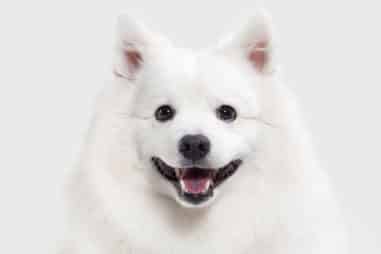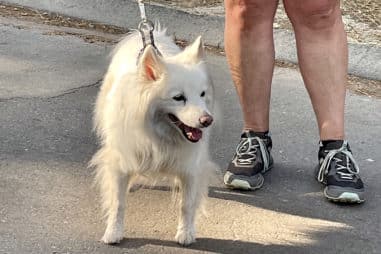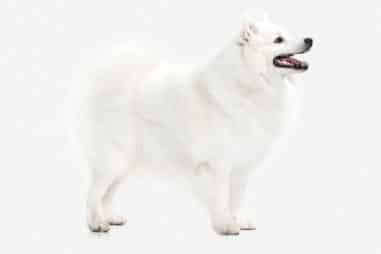You can choose to wade through the wide range of available options in order to discover a brand of dog food that is both healthy and economical while at the same time also appealing to the discriminating taste of your Japanese Spitz for pet food. We’ve compiled here some of the most commonly asked questions and sought out when it comes to feeding a Japanese Spitz dog.
What Food Is Good for Japanese Spitz?
Feeding your Japanese Spitz high-quality food can help keep their shedding under control and ensure they’re staying as healthy as possible. If you have good plans to own this breed anytime soon, or you have one already, that should be your primary goal.
When deciding on the most appropriate diet for your Japanese Spitz dog, it’s important to take into account the natural state of their digestive system and canine anatomy. If you aren’t aware yet, the canine digestive tracts didn’t undergo much development. Dogs, particularly their digestive system, have not undergone any significant change even from the time they were still undomesticated wolves.
The canines, including the Japanese Spitz breed, are best suited to consuming food items that are rich in proteins. This is known as “species-appropriate nutrition,” and it is essentially what an all-natural, raw diet seeks to achieve.
Anatomically-speaking, a dog’s stomach is not designed for processing or digesting carbohydrates. Carbohydrate-rich components comprise the vast majority of dog food found in the pet food market today.
And even if you happen to come across a grain-free kibble, it is inevitable that it will not have a high concentration of starchy carbohydrates from lentils, peas, and other legumes.
Feeding your Japanese Spitz a carbo-based diet runs the risk of putting their system under strain or pressure. When that happens, it will eventually lead to metabolically stressful production of too much insulin as well as spikes in the production of cortisol and glucagon all throughout the day.
Moreover, starch-rich diets can also lead to inflammation, putting their vital organs under extreme pressure, which, in the long run, will set the groundwork for serious health conditions.
Thus, the canine species is, without a doubt, very adaptable. Despite the fact that the majority of pet owners unknowingly subject them to consuming a diet lacking in natural components their bodies need, they are still able to adapt and survive. Nonetheless, we need to know where to draw the line between thriving and surviving.
If you are a true-blue dog lover and just want the best for your pooch, you may develop your own concoction of DIY raw food recipes at home. By this measure, you have the highest assurance that when you switch your dog’s diet to their natural species-specific diet, they will reap optimum benefits from it.
What Is the Best Food for Japanese Spitz?
There are manifold reasons why we say raw feeding is the best option to feed a Japanese Spitz, or any dog for that matter. Hence, we compiled the most essential in no particular order.
Gut Health
Gut health is extremely important for both people and dogs, including your Japanese Spitz. A gut system that is not in very good shape may lead to poor absorption of nutrients and an unbalanced immune response, which causes systemic inflammation and a number of health issues.
Inside the gut is an ecosystem of bacteria referred to as the “microbiome”. In the scientific community, this is known as “gut flora”.
Scientific studies reveal that an imbalance in the microbiome, in terms of good and harmful bacteria, usually sets the stage for the development of various health issues, sans the influence of genetics and calorie consumption, including:
- Diabetes
- Digestive issues
- Skin issues
- Food allergies
- Diabetes
Gut health is essential because it is found to be the missing link in a wide array of health conditions. Compared to a processed food diet, feeding dogs a raw meal significantly improves the microbiome balance because it substantially helps in preserving good bacteria.
Additives, preservatives, synthetics, and chemicals in processed dog food can destabilize the microbiome, which happens when they fuel up harmful bacteria. A microbiome imbalance can lay the groundwork for “Leaky Gut”, a condition characterized by the sudden permeability of the intestinal wall.
The gut has a fragile mucosa lining that is essentially important in carrying digested nutrients into the bloodstream. This mucous coating serves an effective barrier that keeps toxins from passing through and finding their way into the dog’s system.
If this lining becomes compromised, toxins and other noxious substances can “leak” or seep through, and that scenario going on for some time will eventually trigger an immune response. This will cause systemic inflammation to be underway, making your pooch highly susceptible to all kinds of illness.
Immunity
A properly working immune system is integral to keeping the pathogens, toxins, and a wide spectrum of health threats at bay for your Japanese Spitz dog. Since the core of the canine immune system is housed inside the gut, we can say that the gut environment is critical to an effective immune response.
By nourishing the gastrointestinal tract and delivering critical immunity-boosting micronutrients, a raw natural diet will help maximize their natural immunological defenses, ensuring their immune system is in top condition to fight off all those nasties.
Weight
A dog’s proper nutrition is critical regardless of breed. Because Japanese Spitz are predisposed to putting on weight, a diet rich in healthy fats, biologically correct protein and ground bone, and vegetables rich in essential vitamins and minerals is vital for optimum health and performance.
Dogs will typically gain weight while transitioning to a new diet, so pay close attention to your dog’s appearance and weight as they adapt. A number of factors, including size, activity level, and age influence how much you should feed your dog every day.
Smell Better
When we say that your Japanese Spitz puppy is going to have an elevated smell, we are actually referring to the pooch odor that your four-legged pet is emitting.
Besides, you will also notice an observable increase in your pooch’s discharged waste and a reduction in flatulence. Simply put, when you feed your dog a high-quality raw diet, he consumes food that certainly has a higher nutritional content, which is utilized nearly entirely by his body.
Look Better
What transpires on the inside is mirrored in the outside world. So much so, that poor gut health would imply inefficient digestion. This will induce stress and strain on your pooch’s organs and systems, and there is a good probability that it will manifest in your dog’s overall appearance.
Seasoned breeders of Japanese Spitz dogs credit raw feeding as significantly helpful in promoting a dog’s skin condition. The benefits of a raw natural diet are wide, including reduced irritation or itchy flaky skin, elevated coat health, and enhanced fur shine.
Can Japanese Spitz Eat Human Food?
There are certain food items that your dog should not have a taste of. The metabolism of the human body is different from that of a dog or a Japanese Spitz, for that matter.
While we consider our furry animal friends as “family members”, be reminded that they are still dogs. What we mean here is that there are many things in the human food chain that dogs are not supposed to eat.
For safety reasons, one cardinal rule to follow is to refrain from giving your pooch table leftovers. Giving dogs food scraps will work to their disadvantage because it will make them develop a certain level of aversion to dog food, and later on they will avoid/refuse to eat it. You will notice this in dogs that are known to have an obstinate character, such as Beagles.
Another reason is that the majority of human foods are not safe for dog consumption, and some are so harmful that they can even put the very life of a beloved dog on the line.
Feeding your Japanese Spitz table scraps and leftovers encourages begging and this practice will blur the distinction between what is good and bad for them.
We listed below the top food items your dog should not consume:
- Chives, onion and garlic: The onion family can be very harmful when ingested by dogs. They usually induce gastrointestinal discomfort and hemolysis. Complications may start not so soon, but may likely show up days or weeks later.
- Chocolates: Chocolate is toxic to dogs. They contain theobromine, a stimulant that can induce canine kidney failure.
- Macadamia Nuts: This type of nut contains a toxin that induces swelling of the limbs, panting, and lethargy in dogs.
- The Corn Cube: Keep an eye out not to let your furry friend nibble on the corn on the cob. The cob itself causes intestinal obstruction.
- Avocados: Avocado leaves, fruit, and seeds contain persin, which can cause vomiting and diarrhea in dogs and thus make them sick.
- Sweetener (XYLITOL): Xylitol, an artificial sweetener found in some peanut butter products, causes our systems to create insulin. It can cause hypoglycemia and blood coagulation issues in dogs, and your Japanese Spitz dog is not an exemption to that risk.
- Alcohol: Even small amounts of alcohol have a profound impact on dogs. Alcoholic beverages can induce vomiting, intoxication, diarrhea, and even damage your pooch’s central nervous system.
- Bones that have been cooked or boiled: It’s best to avoid cooked bones for your dog. It may induce constipation in your dog, or worse, it can lead to fatal gut perforation.
- Gourmet Grapes: Raisins and those found in pastries, biscuits, and cereals are detrimental to your dog. While there is no concrete evidence yet as to whether the specific chemical component or part of grapes is harmful to a dog, one thing is certain: this fruit can cause serious liver and kidney damage to your pooch.
If your Japanese Spitz, or any breed of dog for that matter, ingests even a small amount of the above mentioned food items, we encourage you to reach out to a nearby veterinary clinic for help and assistance.
Licensed veterinarians know better what to do and they know exactly how to help your dog, even when there are clear signs or indications that your dog may be in for some trouble.
What Human Food Can Japanese Spitz Eat?
The digestive system of dogs is very different from that of ours, humans. This only signifies that some food items that are deemed safe for human consumption are more or less unhealthy or hazardous to them. In the worst case scenario, some can be lethal, too. There are, however, an array of items in the human food chain that ar considered safe for dog or Japanese Spitz consumption.
Here are some of the human foods you can give to your dogs in general:
- Rice: Rice is one of the health-promoting human foods that dogs can also eat. The high amounts of carbohydrates in rice help alleviate an upset stomach. It also contains starch, which is helpful in weight management. The starch in rice makes your dog feel fuller for much longer. This helps a lot in curbing a dog’s strong appetite and thus maintaining their healthy weight!
- Cheese: There is no harm in giving your pooch some cheese if you are certain he is not lactose intolerant. Cheese-derived products contain nutrients like iron and calcium that can boost your dog’s bones! However, you may need to look into joint supplements for dogs if your furry animal suffers from severe arthritic symptoms.
- Salmon: Salmon is good for your Japanese Spitz and dogs in general. They are high in Omega-3 fatty acids but low in fat. Low-fat proteins mean that this type of fish is excellent for growing Japanese Spitz puppies. Meanwhile, Omega-3 fatty acids come with anti-inflammatory properties that help alleviate inflammation and boost immunity. Good alternatives to salmon are herring and tuna.
- Eggs: Most people despise eggs, most of the time due to their negative connotations about it. However, eggs are a great source of protein for a dog. If your pooch happens to have an upset stomach, eggs can work wonders to soothe their upset tummy. In some cases of food poisoning, eggs can be used to neutralize the stomach and thus save the life of a dog on the verge of eventual death. To avoid biotin deficiency, just make sure the eggs are cooked thoroughly.
- Watermelon: You can always share a watermelon with your Japanese Spitz dog on hot summer days to hydrate him. Watermelon juice is 92% natural, naturally sweetened, and rich in vitamins. However, you need to remove the seeds as it may induce an upset stomach. Keep your dog hydrated all the time, and giving them a bite-size watermelon will help you do that.
- Coconuts: Coconut is one of the healthiest human foods that is also great for dogs. It contains vital minerals, including lauric acid, which fights viruses and thus wards off the outset of infections. Coconut comes with a high level of antioxidants that can benefit a dog’s skin and boost their immune system.
- Pumpkin: We can also share pumpkins with our fur babies. They are loaded with vitamins, minerals, and fiber that promote their overall health. Almost every component of a pumpkin is health-giving, from the seeds to the skin to the meat. Aside from nourishment, pumpkin seed and peels can also help protect the urinary tract of your Japanese Spitz dog. Pumpkin seeds are also reputed to help remove parasites, and the fiber content helps in elevating the digestive process.
- Green Peas: Green peas are among the many kinds of human foods that can be eaten by dogs, too. As a gluten-free legume, it is rich in fiber. If your pooch happens to have a sensitive stomach, this legume can be made as part of their daily diet. Fiber-rich foods like green peas help your dog regulate their weight and digestion. Aside from protein and vitamins A, B1, B6, C, and K, green peas are also abundant in carbohydrates to energize your active dog all day.
While the compiled dog-friendly human food items listed above is not exhaustive, there is still a motley of other times that can be offered to your dog. One rule of thumb to follow is to discard the rind, seed, and skin. If you are still in doubt, and want the safest thing for your dog, refrain from offering your pooch scraps of human food.
Can a Japanese Spitz Eat Chicken?
In general, feeding dogs with chicken is as healthy as feeding them with fish, provided that you serve it plain and boiled, sans any kind of salt or seasoning. As much as possible, cook the chicken and serve it without any fat. Chicken meat is a great source of vitamin B, both for humans and our furbabies.
Given the ubiquity of canned dog foods and kibbles in tetra packs that make use of chicken as their primary ingredient, we can surmise that feeding your Japanese Spitz dog chicken is good for them and will not be harmful to them in any way. Beyond any shadow of a doubt, cooked chicken is an excellent source of protein.
Unseasoned poached, roasted, baked or grilled chicken can be offered alone. You can also combine it with the typical meal you serve your dog, or you can also serve it to your pooch as a treat.
When serving chicken to your Japanese Spitz puppy, or to any breed of dog for that matter, there are two things to take into account. Some dogs are prone to have an allergic reaction to chicken. Wheat, eggs, beef, lamb, soy, dairy, chicken, pigs, fish, and rabbits are also known to induce allergies in dogs. Hence, it is important to take caution before serving chicken to your dog, especially if you know that your pup has a sensitive tummy.
Make certain to remove the cooked chicken from the bone. Cooked chicken bones frequently splinter. When that happens, it can lead to accidental choking or gastrointestinal tract perforations. If you’ve determined that your dog eats chicken cheerfully and healthily, you can make it part of their everyday meal.
Can a Japanese Spitz Eat Fish?
Dogs love the smell of fish, and there is a good reason for that. Fish is a great source of protein and is thus frequently used as an alternative protein source in commercial canned dog food products.
Fish come with high concentrations of omega-3 fatty acids, which vets believe have a health-promoting benefit for dogs, like lowering inflammation. And if your Japanese Spitz dog happens to be allergic to chicken meat, fish is an excellent substitute.
While fish is almost always an important component of a home-cooked meal, if you plan to feed your dog a homemade diet with fish in it, we encourage you to verify with your veterinarian first if the food items you are giving your dog meet all their nutritional requirements.
When feeding fish to your dog for the first time, start with a little bite-size piece first until you can determine that your puppy can tolerate it without experiencing an allergic reaction or is not showing signs of gastro-intestinal discomfort.
Can Japanese Spitz Eat Rice?
Rice is beneficial for dogs. It can also help alleviate an upset stomach. However, the point of concern here is whether we can integrate rice as part of their regular diet? Yes, you may absolutely offer rice to your dog.
It is a good source of carbohydrate, which works as an energy source for them if they are active all day. Rice should become an essential component of their healthy diet because it has no unhealthy fats, cholesterol, or sodium. Additionally, it also supports normal functioning of the brain, in both humans and dogs.
What is the Proper Way of Feeding Rice to Your Dog?
When serving rice to your Japanese Spitz, do it in small amounts only, otherwise it might induce them to suffer from bowel obstruction. When it comes to variety, it is okay to feed your pooch any type of rice, provided that it is cooked or steamed.
Canines suffering from diarrhea can also benefit from eating rice. And due to their high fiber content, make sure your dog drinks plenty of water. This will prevent constipation. However, serving rice at every opportunity or meal runs the risk of possible long-term health repercussions. But this is not going to be a matter of concern if you are serving your Japanese Spitz dog a wide variety of meals every now and then.
Can Japanese Spitz Eat Fruit?
It is generally safe for most dogs, including Japanese Spitz, to eat a wide range of fruits and not be a tad worried that it will put them in harm’s way. Since most fruits have natural sugars in them, pet owners should offer them to their fur babies in moderation.
When introducing a new fruit to your pet or adding one kind to their diet, we encourage you to take things slowly, one fruit at a time. This way, your pet’s body can adapt itself to the fruit without developing any kind of adverse reaction or allergy.
Bananas make a fantastic treat for dogs of all breeds. Potassium, vitamins, biotin, fiber, and copper are abundant in these fruits. You can even present an apple to your furry friend, but see to it that you take out and discard the seeds first.
Blueberries, which are high in antioxidants like resveratrol, are also a dog-friendly fruit. These antioxidants are reputed to prevent damage and degradation of the cells in the body, fight the outset of cancer cells, and help in keeping heart diseases at bay. Additionally, blueberries also contain tannins, which promote the treatment of urinary tract infections. All of these helpful characteristics come together to make blueberries a fantastic treat for any dog, regardless of breed.
In the case of blackberries, they are an amazing resource for essential vitamins and minerals. Hence, they make an excellent treat for your fur babies and even adult canines. As is the case with most fruits, it is advisable to offer your dog only a few at a time. From there, observe if your dog will like the taste of this fruit so you can decide, more or less, if you should serve him more or not.
As for the oranges, they are a wonderful source of vitamin C and your pet can also obtain their potassium needs from them. While not all dogs like the taste of citrus fruits, many dogs would prefer to eat an orange. Just make sure that you peel off the skin first and discard the seeds.
Pumpkin is another excellent fruit you can give to your dog, being an excellent source of vitamin A and fiber. Prepare steamed pumpkin flesh whenever your Japanese Spitz is having constipation or is suffering from diarrhea. Moreover, this fruit can also be taken advantage of to help dogs having trouble expressing their anal glands.
When adding fruit to your pet’s diet, it is recommended to begin with one type of fruit and as time goes by, gradually increase the variety. This way, you will be able to determine what specific fruit your pooch prefers the most and how his body and systems are affected by it.
One cardinal rule to remember when feeding your Japanese Spitz with fruit is to peel the skin first and discard the seeds before serving it to your dog. They can easily get lodged in your dog’s gut or intestines, which will necessitate an emergency surgery.
See to it that you keep it to a minimum when offering your dog fruits. Since the vast majority of fruits contain natural sugar, it is not going to be healthy for your dog to eat excessive amounts of any of them. Otherwise, it will set the stage for obesity and diabetes.
Can a Japanese Spitz Eat Bananas?
Pet owners are naturally curious with regard to the fruits and vegetables that are safe and good for their dogs. If you have been hankering to know whether dogs can eat bananas, the answer is yes, they can.
Bananas are reputed to have high concentrations of vitamin B6, potassium, and vitamin C. Hence, one of the reasons why veterinarians highly recommend this fruit as a better alternative to salty or fatty dog treats or snacks. Bananas are also super rich in fiber, which can help address persistent digestive issues in dogs.
The magnesium content of bananas supports bone growth and assists the canine body in absorbing its required proteins. However, like everything else, practice moderation when serving bananas to your Japanese Spitz, considering the fact that they have high sugar content.
Also, be cautious of banana peels. While banana peels are not known to put a dog in harm’s way, they are somewhat not easily digested and thus may induce blockage. With or without the banana peel, you should not overfeed your pooch with too many bananas because it runs the risk of having your pooch suffer from an upset stomach.
Can a Japanese Spitz Eat Watermelon?
Can you include watermelon in a dog’s meal? Yes! Absolutely! There is no harm in doing that. You may offer your dog watermelon. But then again, like with everything else, there are some things that you need to know first before you finally give your dog a bite of this delectable summer fruit.
This tropical fruit is loaded with nutrients and vitamins that will help promote your dog’s overall health, and since it is 92% water, it is incredibly refreshing on a hot summer day. Watermelon is brimming with nutrients beneficial for dogs, such as potassium and vitamins C, A, B6, and. Plus, it is also high in fiber, which supports effective food digestion.
While watermelon has natural sugar in it, this fruit’s fiber insulates the sugar and thus inhibits it from being ingested too rapidly into the bloodstream. Moreover, it also has lycopene, an antioxidant that may help prevent cancer. And since it is low in calories and sodium, no fat and cholesterol free, it readily qualifies as a better and healthier alternative than store-bought dog treats.
Even though this fruit is good for your Japanese Spitz dog and dogs in general, it should not make up a significant portion of a dog’s diet. Fur babies that consume an excessive amount of watermelon are susceptible to suffering from tummy aches, diarrhea, and other indicators of gastrointestinal trouble. Remember, everything that is in excess can be a bad thing.
Some dogs experience an upset stomach when they are introduced to a new food. For this reason, we encourage that you introduce watermelon to your dog incrementally, especially if it is their first time having a taste of this fruit, and observe their reaction.
Watermelon seeds might be a hazard to some dogs. While one or two seeds may seem insignificant, a substantial number may lead to issues like blockage in the digestive tract. Furthermore, the rinds are also not safe to consume. While dogs can nibble on the light green interiors of the fruit, this part of the fruit is tough to chew.
As for the watermelon skin, this is extremely tough to digest. If eaten, it might just end up causing additional blockage. Smaller breeds of dogs are more vulnerable to this.
Can Japanese Spitz Eat Grapes?
Are grapes safe for dogs to eat? The answer is simple: No, they shouldn’t eat grapes at all costs. This also applies to raisins, which are basically desiccated or dried-up grapes.
Grapes and raisins are known to be particularly toxic to dogs, though research has yet to identify exactly what specific part or element of the fruit causes this adverse reaction. For this reason, you also need to refrain from giving your dog peeled or seedless grapes.
Regardless of the sex, age, or breed, they have no bearing on the risk that this fruit can bring. And due to the fact that no safe dosage has been established yet by the scientific community, you and your Japanese Spitz should be on the safe side of the boat—that is, veer away from grapes to your dog.
Even a single grape/raisin can be fatal to a dog, because chances are high that its toxicity level is strong enough to jeopardize its life. A dog eating grapes will pave the way for its renal organs to fail in their function. If your Japanese Spitz dog accidentally ingests grapes, you don’t need to waste time seeking vet care. This is crucial even if there are no immediate outward signs that your pooch is going to be in a bad shape.
Check in with a licensed veterinarian near you as soon as possible. In such cases, know that you are racing against time. Hence, your veterinarian might encourage you to induce vomiting at all cost as an initial first aid. But try not to do so if you notice that your dog is having difficulty breathing. Also, don’t make your dog vomit if he is unconscious or displaying indications of distress.
Can Japanese Spitz Eat Vegetables?
While the human body requires consumption of fruits and vegetables to remain in the pink of good health, the inquisitive minds of many fur parents are wondering if dogs need them, too. Experts say that eating vegetables is not a major requirement for a dog’s health, but they are not detrimental to their overall wellbeing.
As a matter of fact, eating vegetables and incorporating them to your dog’s daily diet can be very beneficial for them. Carbohydrate-rich corn and potatoes provide them with fiber and essential minerals. However, dogs do not need vegetables to obtain these nutrients.
While you don’t need to include veggies in your dog’s diet, this does mean to say that you shouldn’t. Many pet owners provide carrots, green beans, or broccoli as a token of reward or as a healthier treat for their dogs.
However, avoid serving an overwhelming number of vegetables as a treat or snack. Treats of any type should not go above 10% of your dog’s diet. You may reach out to your veterinarian to understand what this signifies with respect to the weight and activity level of your Japanese Spitz.
But in the case of canine overweight issues, the vast majority of vets advocate adding vegetables to their diet as a filler. It will significantly help in making their meals even more satisfying while consuming only fewer calories.
Just be aware that hastily switching from meaty treats to fiber-filled veggie treats can sometimes be taxing for their system. To help ease up the changeover, you can steam raw veggies so they will soften slightly first before serving to your pooch. Alternatively, if you have a good blender at home, you can purée them instead.
Can Japanese Spitz Eat Carrots?
Carrots are safe for dogs to consume. Indeed, this vegetable is not only harmless, but it is also a low-calorie, highly-nutritious snack that you can give to your Japanese Spitz.
Carrots, in their cooked and raw form, can be very nourishing for dogs and can make an excellent accompaniment to their regular meals. While carrots are generally acceptable to serve as treats for dogs, it is critical that you cut them first into bite-size parts before offering them to your pooch as treats. By this measure, you are going to keep choking hazards at bay, to which small breeds of dogs are at most risk.
Another reason why this vegetable is an ideal snack for dogs and your Japanese Spitz, as opposed to other traditional dog food treats and kibbles, is that it is low in calories.
Some veterinarians would even encourage pet owners to offer them cold or even frozen sticks of teething puppies. In addition to that, chewing on carrots can also improve your dog’s oral health because they are high in potassium, fiber, vitamin A, and other nutrients.
Can Japanese Spitz Drink Milk?
It is safe for any dog to drink milk, but as much as possible, only in small amounts. But we are not encouraging you to give your dog an entire bowl at once. Doing so runs the risk of causing your pooch to suffer from diarrhea, vomiting, and loose bowel movement.
Since milk is high in fat and natural sugars, you should give your dog small amounts only. Obesity and pancreatitis are common risk factors to watch out for if your dog’s diet is always high in fat.
A good number of dogs today can be considered as lactose intolerant. This only signifies they have a hard time digesting milk. While some lactose intolerant dogs have difficulty drinking milk, most of them can tolerate dairy products such as plain yogurt or cheese. Most of the time, these products are far easier to digest compared to whole milk.
More often than not, pet owners are unaware that their pets are lactose intolerant until they begin to feed them milk. Knowing whether your Japanese Spitz is lactose intolerant or not can be a bit of a challenge if your pup has taken a substantial amount of milk, because it can also induce vomiting and diarrhea in dogs that are not lactose intolerant.
If, however, your dog develops any of the above mentioned symptoms after ingesting a moderate amount of milk, consider giving your pooch another kind of treat.
What Do Japanese Spitz Like to Eat?
Unfortunately, some people make the mistake of implying that anything besides meat is filler in a dog’s diet, but there is no truth to that. Except when your dog has a particular sensitivity, diets that are loaded with fruits, vegetables, and whole grains provide puppies with the right amount of fiber, vitamins, and minerals which their bodies require to grow fast and remain healthy.
As is the case with many human foods, dog food quality varies by virtue of breed. Checking the label when buying dog food products has always been encouraged and a good practice. Doing so will help you verify if the item you are about to purchase is of the highest possible quality. There are only too few laws that govern labeling of dog food which consumers need to be aware of.
The Name – The name of, say, canned dog food product itself is significant and something to look into. Dog food products are not randomly named after a particular meat, but most of the time the name will be based on how much meat was put into it.
Existing laws state that dog food labeled with only the name of the meat, like “chicken” or “beef,” must have at least 70% of that meat. Nevertheless, terms like “chicken supper” or “with chicken” mean the product offering contains only around 10% or 3% genuine chicken meat in it.
When shopping for high-grade canned dog food, always look for the words “complete and balanced” on the product label. The Association of American Feed Control Officials defined this phrase with a purpose, so it is safe to say that the term itself is not just for show. It denotes that the product satisfies the basic requirements of a dog’s nutritional needs.
It follows the same order as human food, by arranging the ingredients in descending order based on how much they have. One of the main things you’re looking for in a grocery list is if meat is included in the top half. If that is the case, it signifies higher-quality food.
What Type of Dog Food is Most Appealing to Our Fur Babies?
Dog foods found in the market nowadays can be classified into 2 groups, the wet and the dry variety. While dry dog food is more convenient and economical, canines seem to have a special leaning for the wet dog food variety.
Wet food usually has a richer aroma, which can heighten up its appeal factor to canines. And since wet food comes with a rather softer texture, your Japanese Spitz dog will find them far easier to nibble on.
In addition to the benefits indicated above, the wet food variety also helps in a dog’s hydration needs. If there is one drawback to this type of food for your Japanese Spitz, it has to be the price tag.
The wet type of dog food tends to command a higher price than its dry counterpart. But if you are the type of pet owner who wants to give the best of both types of dog food to your fur baby, you can actually meld them together.
How Much Food Should a Japanese Spitz Eat?
A Japanese Spitz breed is an active, highly energetic dog who needs a dry kibble mix that is specifically created for small-breed dogs. These carefully formulated dog foods can sustain their high metabolism. Plus, they help keep tartar and plaque from building on your dog’s teeth, which is the primary reason behind the formation of cavities.
If given half a chance, the Japanese Spitz dog will gobble up anything you throw his way. If you have a puppy, you can feed him 3 times a day, but we recommend you do it in just one place every time. This way, he will remember the spot as the only designated place where you will serve his meal.
You can start feeding your puppy 2 times a day only after the lapse of 10 to 12 weeks from the time of his birth. Then, 15 minutes after your pooch has wrapped up his meal, you must take away his food bowl. If there are any residual food particles left, you can just discard them off.
Now, if you want your Japanese Spitz’s stomach to crave food only at designated times of the day, what you can do is put up a schedule for their meal time. This technique, in conjunction with the appropriate amount of dog food offered to them, will keep your dogs from being hungry beyond your assigned meal hours.
By the same token, you can effectively regulate their metabolism while their bodies will fully and completely utilize whatever food they consume.
How Much Should a Japanese Spitz Weight?
Right now, there is still a running debate among kennel organizations as to the proper size of adult Japanese Spitz dogs that should be kept. But these dogs generally measure between 10 and 16 inches in height at the shoulders.
On the other hand, females are significantly shorter than males. Dogs of this breed typically weigh between 11 and 20 pounds on average, or 5–9.1 kg.
A Japanese Spitz that is eight weeks old should weigh between 2.5 kg and 3 kg. Because of its rapid maturation, this breed achieves its maximum height when they become 8 months old.
What Is the Best Dog Food for Japanese Spitz?
As a dog owner, it is ultimately up to you to decide what dog food works best for your Japanese Spitz. It is because you are the one who interacts with your pet on a regular, continuous basis. If your dog has a firm stool, is fit and active, and finishes eating his food, then the choice of dog food you have for your dog is most likely doing its job perfectly.
A reputable veterinarian is a valuable resource for pet owners in this regard. One cannot underestimate the knowledge and experience they have when it comes to pet care and nutrition. They know a lot of things that many average pet owners are not even aware of.
A duly licensed vet can assist you in narrowing down your choices and should be more than willing to assist you in finding the most relevant answers to your concerns regarding your Japanese Spitz’s dog food.
What Can You Not Feed Japanese Spitz?
Prior to the advent of prepackaged pet food, most dogs and cats thrived on scraps and leftovers from human dining tables. This was a fad before but gained revived popularity in 2007 following the deaths of thousands of dogs and cats due to consumption of melamine-contaminated pet food from China.
Today, a growing number of pet owners are choosing to prepare their pets’ food at home. This way, they know exactly what goes into their dog’s meal served in their food bowl.
While this is an appropriate way to feed your Japanese Spitz dog, we can’t deny the fact that some human foods are not suitable for a cat or dog. Indeed, certain foods can put your Japanese Spitz dog in harm’s way.
Therefore, before you begin scraping leftovers into your pet’s bowl, you need to know your pet’s dietary requirements and the food items that are good and harmful for them to eat. The following human foods are not intended for canine consumption:
- Chocolate
- High sodium foods, including bacon
- Garlic
- Grapes and raisins
- Coffee
- Avocados
- Onions
- Macadamia nuts
- Chewing gum
- Soft drinks
- Any kind of food containing Xylitol
- Yeast dough

